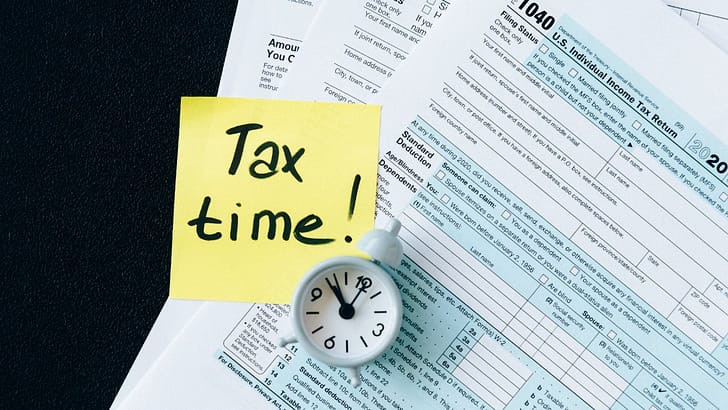In this article, you are going to get a better understanding of the US taxation system applicable to international students on F1, J1, M1, and Q1 visas. In particular, you will learn how to file a tax return as a US international student, and potentially get money from the IRS in the form of a tax refund.
Like Benjamin Franklin said about the American world, "nothing is certain except death and taxes".
As an international student in America, while you may be unable to avoid paying taxes, the more you understand about US taxes the better you'll be at navigating the complicated US taxation system.
Myth Busted: As an international student you are NOT exempt from paying US income taxes.
We independently review everything we recommend. When you buy through our links, we may earn a commission. See our disclosure.
When to file your US tax return in 2025
For income earned in the US as an international student, the deadline to file your federal and state tax return (if applicable) is usually on or just after April 15th of each calendar year.
For the year 2025, the deadline to file your federal tax return with the Internal Revenue Service (IRS) is April 15th of 2025.
While the deadline to file your state tax return would depend on your state (or states) of residence in the last calendar year. So consult your state's tax website accordingly.

Tax return deadlines are usually on of after the 15th day of April
Why should I file a US tax return as an international student?
There are several reasons why you should file a tax return as an international student, some of which you might be unaware of:
Receive a tax refund from excessive tax withholding
This is by far the biggest reason why Americans get excited for tax season. And you should too!
Comply with US immigration rules
As an international student, you have a tax filing obligation (for at least 1 tax form) for anytime you spent in the US in a given calendar year, even in situations where you do not need to file a tax return because you did not receive any income.
A consistent record of maintaining your US tax filing obligation demonstrates your ability to not only comply with US laws but your willingness to contribute to the American society.
Your good record of filing US taxes could favor you in the future when seeking to immigrate to the US as a permanent resident or when trying to enter the US on a future non-immigrant visa.
Claim a benefit for any tax deductions or tax credits
International students from countries that have a tax treaty with the US could benefit from certain deductions and tax credits if they file a US tax return.
Pay any outstanding taxes owed to the IRS on time
Just as the IRS could owe you a tax refund, you could also owe them an outstanding tax payment when you prepare your tax return. If this is the case you would want to ensure you send them their check before the IRS comes after you.
Failing to pay your taxes to the IRS would not only result in you accruing an interest on the outstanding tax amount but could also jeopardize your future immigration plans to the US.
Tax Residency Status for International Students
How you file your federal tax return would depend on what the IRS calls your tax residency as a non-immigrant.
Non-immigrants in the US are considered as either nonresident aliens for tax purposes or resident aliens for tax purposes.
Residency as defined by the IRS and US tax laws must not be mistaken for residency as defined by US immigration law. A resident alien for tax purposes is not the same thing as a US permanent resident.
Generally, international students on F1, J1, M1, and Q1 visas are considered nonresident aliens for tax purposes if they have been in the US for less than 5 calendar years.
The biggest difference between these two categories is in the taxes imposed on non-US or foreign income.
As an international student who is considered a nonresident alien, you are not required to pay taxes on income from foreign sources. You only pay taxes on income that is derived from a US source.
On the contrary, an international student who is considered a resident alien for tax purposes must declare all income sources from outside the US and must pay taxes on this foreign income.

International students who are considered nonresident aliens for tax purposes only pay income taxes from US sources.
What types of US income do international students pay taxes on?
The most common ways international students can earn income from US sources and thus pay income taxes are from:
- Wages or Salaries paid by a US employer from any authorized employment
Authorized employment for international students include on-campus jobs, Curricular Practical Training (CPT) for F-1 students, Optional Practical Training (OPT) for F-1 and M-1 students, and Academic Training for J1 students. - Scholarships, grants, and fellowships from US institutions
- Capital gains from buying and selling US traded stocks or virtual currencies
- Interests from passive investments
- Dividend payments and Gambling wins.
How to file a tax return as an international student
Typically a portion of your income from any of the above sources may be withheld by your US employer or a US institution providing the income.
This money that may be taken away from your paycheck - in the form of a withholding - is then reported to the IRS as payment of your federal and state tax, if applicable.
For example, if you received income through an on-campus employment in the previous year, all the money that your employer (in this case your University) took away from your paycheck in the previous calendar year would be reported in a form called Form W2.
Your employer is required to send your Form W2 no later than January 31 of the following calendar year.
Similarly money taken away from a scholarship or fellowship you received in the previous calendar year is reported on a form called the Form 1042-S.
This form 1042-S should be distributed to you no later than March 15th of the following calendar year.
In the case that you receive income from an interest or dividend payment, or you worked as an independent contractor while on OPT, you may receive a form called a 1099 for the trade with a US business entity or a third party.
This 1099 reports the total income you received from the third party, and generally does not have any income withheld by the third party. Therefore, you are obligated to pay income taxes on this income.

Capital gains arising from the sale of virtual currencies or stocks you owned as an international student are subject to US taxation as well
When you prepare your tax return for the previous tax year, you would be calculating the exact amount you owe in taxes to the IRS and comparing that to the total amount that has already been withheld as indicated in a W2, a 1042-S or a 1099.
If more money has been taken away than what you owe, you would qualify to receive a tax refund for the excess taxes you paid.
On the other hand, if less money has been taken away than what you owe to the IRS, you are required to pay the balance.
There are serious consequences for failing to pay this outstanding tax to the IRS before the typical tax deadline of April 15th.
What forms do I need to file my taxes as an international student?
International students considered as nonresident aliens for tax purposes must file their federal tax return using the Form 1040NR called the U.S. Nonresident Alien Income Tax Return. This form along with a 1040NR instruction guide could be obtained from the IRS website.
In addition, you will also need to complete the Form 8843 - Statement for Exempt Individuals and Individuals with a Medical Condition and submit it along with your 1040 NR.
You will need your social security number (SSN) or an individual tax identification number (ITIN) when completing these tax forms.
While the IRS provides an option to electronically file the 1040NR, it's quite restrictive and does not apply to all types of nonresident alien tax payers.
Thus, the sure way to file your 1040 NR is to complete it, then sign and mail it to the IRS.
If you have lived and worked in a state (or states) during the tax year that impose an income tax, you would have to file a state tax return for each state.
The type of tax return to be submitted varies from one state to another. So consult your state's tax website accordingly.

The form 1040NR must be used by international students filing their tax returns as nonresident aliens for tax purposes
TurboTax and international student tax returns (Avoid this Mistake)
A major mistake US international students make when filing their federal tax returns is using free online tax filing services provided by big companies such as TurboTax and H&R block.
The free online tax service provided by these companies are ONLY for US citizens and resident aliens for tax purposes, and not for nonresident aliens for tax purposes.
Unless you are an international student considered a resident alien for tax purposes, to avoid making this mistake in 2022, you can either:
- Print and prepare the paper Form 1040NR by yourself for free and then submit it to the IRS
- Prepare the 1040 NR electronically for free using special tax filing services provided by your university for its international students. After which you can print and submit the completed 1040 NR to the IRS
- Alternatively, you could also consider a paid option with a tax preparation software such as Sprintax. Sprintax offers an online self-preparation software providing an all-in-one solution for non-resident aliens filing US federal and state taxes. Get $5 off your filing fee when you use our discount code 23SJS100F5 valid for for the first 100 users.
With Sprintax, you can guarantee that you are receiving the maximum legal tax refund, as well as other tax treaty benefits you might be eligible for.

Preparing US tax returns as an international student does not need to be a daunting task.
Tax return for international students with no income?
International students who are nonresident aliens with no US source of income do not have to submit a tax return.
However, you are still required to timely submit the Form 8843 every tax year.
Where to submit your tax return forms?
On the Form 1040NR instruction guide, you can find the address where the 1040 NR should be mailed.
If you expect a tax refund based on your completed individual tax return, the 1040 NR should be sent to:
Department of the Treasury
Internal Revenue Service
Austin, TX 73301-0215
U.S.A.
If your completed individual tax return indicates that you owe the IRS taxes, then you should send the 1040 NR along side a payment to:
Internal Revenue Service
P.O. Box 1303
Charlotte, NC 28201-1303
U.S.A.
Where you submit your individual state tax return form will depend on your state of residence.
How long does it take to obtain a tax refund after filing?
How soon you receive a tax refund from the IRS would depend on what mode you used to submit your tax return. If you file your tax return electronically, you can expect a refund to be issued in less than three weeks.
And if you file a paper tax return it might take between 6 - 8 weeks to receive your tax refund (which is the case for most nonresident alien tax filers).
Certain international students who are considered nonresident aliens for tax purposes may be eligible to electronically file their federal tax returns using Sprintax. Thereby ensuring that they obtain their tax refunds quicker.
For state tax refunds, the processing time varies from state to state. Generally for most states, you can expect to obtain your state tax refund within 4 weeks if you submitted your tax return electronically.
While for state tax returns that are submitted in the mail, it could take as long as 12 weeks to obtain your state tax refund.
International Student Tax Return FAQs
Do F1 students get tax refunds?
Yes. F1 international students as well as other student visa classes are eligible to receive a tax refund from the IRS for any excessive taxes that were paid during the tax year.
What happens if you don't file taxes as an international student?
Failing to file your taxes during the tax year could cause the IRS to issue you a fine for any outstanding taxes you owe. Furthermore, you might be denied immigration into the US in the future for failing to pay your taxes.
Can F1 students file tax return electronically?
Certain F1 students considered nonresident aliens for tax purposes can file their tax returns electronically using Sprintax.
Do international students pay taxes on scholarships?
Scholarships received from US sources in the form of stipends are generally considered as taxable income. This is usually reported on the Form 1042-S, and an international student is required to pay taxes on this income.
Can I use TurboTax or H&R Block to file my taxes as an international student?
Only international students considered resident aliens for tax purposes should file taxes using TurboTax or H&R Block. You can use Sprintax to file your taxes if you are a nonresident alien for tax purposes. Get $5 off your filing fee when you use our discount code 23SJS100F5 valid for for the first 100 users.
Can international students file taxes without SSN?
Yes. International students who are not eligible to receive an SSN can apply for an Individual Tax Identification Number (ITIN) when filing a tax return.
Do international students get stimulus checks?
Generally, international students considered resident aliens for tax purposes are eligible to receive stimulus checks from the Internal Revenue Service (IRS).
Conclusion
Filing your tax return as an international student no longer needs to be a nerve-racking experience.
Given the limitations on how international students could earn an income in the US, the tax complexities most international students face is generally less than those of US citizens who have far more options to earn an income - legally of course.
Therefore, a basic understanding of the US tax system related to nonresident aliens goes a long way.
Disclaimer: The content in this blog post should not be considered as tax or financial advice, given the complexities of the US tax codes, we highly recommend you seek a licensed tax specialist for personalized tax advice.


